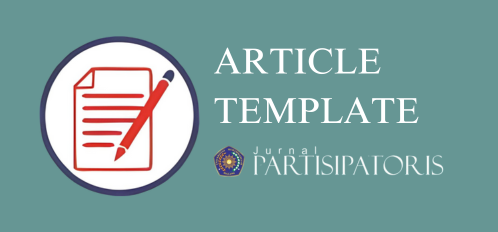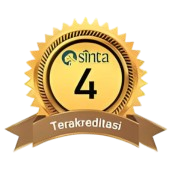JIMPITAN DIGITAL: MODEL INOVASI SOSIAL BAGI MASYARAKAT URBAN UNTUK MENINGKATKAN SOLIDARITAS SOSIAL
DOI:
https://doi.org/10.22219/jp.v6i1.35089Abstract
The current development of urban society shows a change in the character of society which has become more individualistic, with a society style that is instantaneous and practical, this gives rise to problems of social solidarity and solidarity in people's lives, through innovation in this digital pinch, researchers are trying to solve this. This study used a descriptive qualitative method, involving urban communities as informants, the data taken was obtained from several community activity channels such as: social gathering groups and also recitation groups. The research results show that the digital jimpitan innovation model has succeeded in providing an alternative for making the use of collecting donations more effective and efficient
Downloads
References
Juniar, N. M., Nurmahmudha, D. F., Wahdiyah, I., Tanjung, K., Ardika, Y. M., Iskandar, A. T., & Rawita, I. S. (2022). Karakteristik Masyarakat Perkotaan di Komplek Depag Kota Serang Banten. soshumdik, 43-54.
Syah, H. (2013). Urbanisasi dan Modernisasi (Studi Tentang Perubahan Sistem Nilai Budaya Masyarakat Urban di Pangkalan Kerinci Kabupaten Pelalawan). Toleransi, 1 - 12.
Ardiansyah, M. (2022). Karakteristik Sosial-Budaya Masyarakat Urban Diakibatkan Perubahan Kondisi Sosial. IDEAS , 1 - 10.
Muhammad, N. (2017). Resistensi Masyarakat Urban Dan Masyarakat Tradisional Dalam Menyikapi Perubahan Sosial. Substantia, 149 - 168.
Zaman, S. (2017). Pola konsumtif Masyarakat Urban dalam Perspektif semiotik dan budaya. Paradigma : jurnal Kajian Budaya, 40 - 49.
Haris, A. (2015). Studi media dan Perpustakaan tentang urbanisasi. Jupiter, 60 - 65.
Hidayati, I. (2021). Urbanisasi dan Dampak Sosial di Kota Besar Indonesia. Jurnal Ilmiah Ilmu Sosial, 212-221.
Saputro, A. (2020). URBAN CRISIS: Produk Kegagalan Urbanisasi di Indonesia. Sosiologi Reflektif, 173 - 194.
Dewi, Y. S. (2017). Arus Urbanisasi dan Smart City. Prosiding Seminar Nasional Inovasi Teknologi – SNITek (hal. 21 - 27). Jakarta: Universitas Satya Negara Indonesia (USNI).
Zulfiyah, I., & Imron, A. (2017). Masyarakat Miskin Urban di Stren Kali Barata Jaya Surabaya . Paradigma, 1 - 10.
Rostanti, Q. (2022, Maret Kamis). Republika. Diambil kembali dari https://news.republika.co.id/: https://news.republika.co.id/
Goleo, A. (2022, Oktober1 17). Kompasiana. Diambil kembali dari https://www.kompasiana.com/: https://www.kompasiana.com/
Harsono, W. (2014). Jimpitan, Modal Sosial yang Menjadi Solusi Permasalahan Masyarakat Wiji. JKAP : Jurnal Kebijakan & Administrasi Publik, 131 - 146.
Pambudi, R. D. (2020). Pelestarian Jimpitan sebagai Upaya Pemberdayaan Masyarakat dalam Pembangunan di Kelurahan Patemon, Gunung Pati, Kota Semarang. Forum Ilmu Sosial, 37-45.
Hasyim, M., & Pratama, O. G. (2014). Pelestarian tradisi uang jimpitan di lingkungan dusun ngepuh lor, desa banyusidi, Pakis, Magelang, Jawa Tengah. Jurnal Inovasi dan Kewirausahaan, 151 - 154.
Saria, K. A., Eskasasnanda, I. D., & Idris. (2020). Jimpitan: Tradisi Masyarakat kota di era Modern. Sejarah dan Budaya,, 53-61.
Diantoro, F. (2020). Realisasi Program Jimpitan Karang Taruna Bugis Generation dalam meningkatkan peran sosial kemasyarakatan. Indonesian Engagement Journal, 161 - 168.
Maulana, B. A., Adha, M. M., & Kusuma, F. A. (2022). Pengaruh Tradisi Jimpitan Terhadap Kepedulian Sosial Masyarakat di Dusun Adi Luwih. De Cive: Jurnal Penelitian Pendidikan Pancasila dan Kewarganegaraan, 1 - 12.
Setyawan, B. W., & Nuro’in, A. S. (2021). Tradisi Jimpitan sebagai upaya membangun nilai sosial dan gotong royong masyarakat jawa. Jurnal Diwangkara, 7-15.
Downloads
Published
How to Cite
Issue
Section
License

This work is licensed under a Creative Commons Attribution-ShareAlike 4.0 International License.
Authors who publish with Jurnal Partisipatoris agree to the following terms:
- For all articles published in the Jurnal partisipatoris, copyright is retained by the authors. Authors give permission to the publisher to announce the work with conditions. When the manuscript is accepted for publication, the authors agree to the automatic transfer of non-exclusive publishing rights to the publisher.
- Authors retain copyright and grant the journal right of first publication with the work simultaneously licensed under a Creative Commons Attribution-ShareAlike 4.0 International License that allows others to share the work with an acknowledgment of the work's authorship and initial publication in this journal.
- Authors are able to enter into separate, additional contractual arrangements for the non-exclusive distribution of the journal's published version of the work (e.g., post it to an institutional repository or publish it in a book), with an acknowledgment of its initial publication in this journal.
- Authors are permitted and encouraged to post their work online (e.g., in institutional repositories or on their website) prior to and during the submission process, as it can lead to productive exchanges, as well as earlier and greater citation of published work (See The Effect of Open Access).











